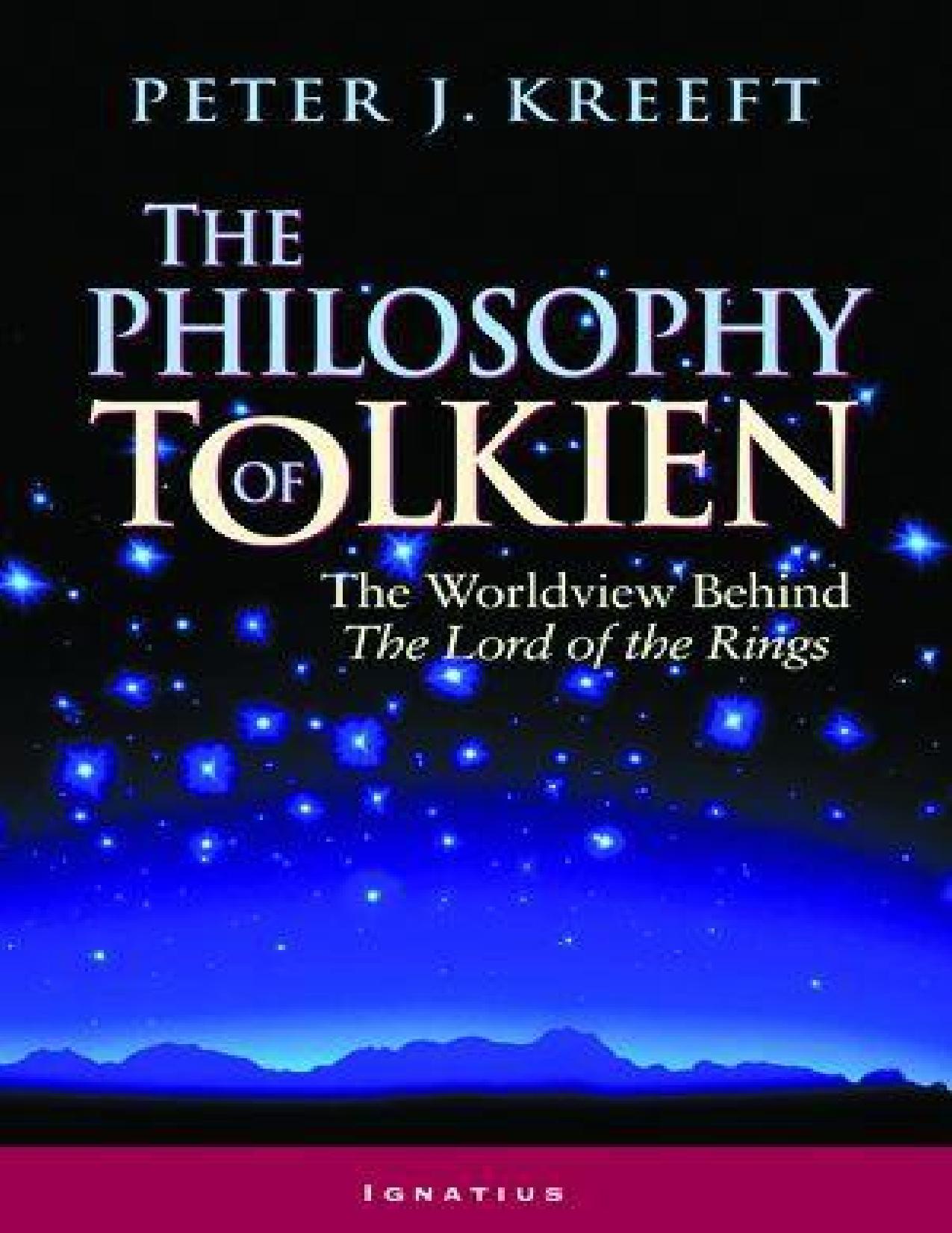The Philosophy of Tolkien by Kreeft Peter

Author:Kreeft, Peter [Kreeft, Peter]
Language: eng
Format: epub, mobi, pdf
Tags: Spiritual & Religion
ISBN: 9781586170257
Publisher: Ignatius Press
Published: 2009-04-09T00:00:00+00:00
6.3 Is faith (trust) wisdom or ignorance?
The Lord of the Rings never shows us a choice for or against any explicitly religious or supernatural faith. But it shows us many choices for or against natural faith as a way of knowing.
It is the Hobbits who best exemplify the epistemological virtue of faith because of their humility. Humility is not only a moral virtue but an epistemological virtue too. The Hobbits show this virtue because they are relatively innocent and childlike (and sometimes even childish, which is not a virtue); and this apparent weakness, surprisingly, is their strength—as Gandalf, alone among the great Wizards, sees (LOTR, p. 264). Sauron and Saruman both discount the Hobbits, to their peril. Both have their kingdoms destroyed by the work of the Hobbits!
Jesus makes childlike trust the prerequisite for entering His kingdom: "Unless you turn and become like children, you will never enter the kingdom of heaven" (Mt 18:3). Tolkien says something similar:
There is a truth in Andrew Lang's words (sentimental though they may sound): "He who would enter into the Kingdom of Faerie should have the heart of a little child." For that possession is necessary to all high adventure, into kingdoms both less and far greater than Faerie. But humility and innocence—these things "the heart of a child" must mean in such a context—do not necessarily imply an uncritical wonder, nor indeed an uncritical tenderness ("On Fairy-Stories", p. 43).
Faith is not foolish or irrational.
C. S. Lewis's essay "On Obstinacy in Belief" is the clearest rational justification I know of faith as a way of reliable knowing that goes beyond reason but yet is perfectly reasonable. It is the answer to those who would criticize Tolkien or his heroes for being naive and irrational for trusting:
[T]he scientist thinks it his duty to proportion the strength of his belief exactly to the evidence; to believe less as there is less evidence and to withdraw belief altogether when reliable adverse evidence turns up.... [This is called "Clifford's Rule" in philosophy.]
If, for the first time, a doubt of his wife's fidelity crosses the scientist's mind, does he consider it his duty at once to entertain this doubt with complete impartiality, at once to evolve a series of experiments by which it can be tested, and to await the result with pure neutrality of mind? . . .
There are times when we can do all that a fellow creature needs only if he will trust us. In getting a dog out of a trap, in extracting a thorn from a child's finger, in teaching a boy to swim or rescuing one who can't, in getting a frightened beginner over a nasty place on a mountain, the one fatal obstacle may be their distrust. We are asking them . . . to accept apparent impossibilities: that moving the paw farther back into the trap is the way to get it out—that hurting the finger very much more will stop the finger hurting—that water which is obviously permeable will resist
Download
The Philosophy of Tolkien by Kreeft Peter.mobi
The Philosophy of Tolkien by Kreeft Peter.pdf
This site does not store any files on its server. We only index and link to content provided by other sites. Please contact the content providers to delete copyright contents if any and email us, we'll remove relevant links or contents immediately.
| African | Asian |
| Australian & Oceanian | Canadian |
| Caribbean & Latin American | European |
| Jewish | Middle Eastern |
| Russian | United States |
4 3 2 1: A Novel by Paul Auster(11047)
The handmaid's tale by Margaret Atwood(6852)
Giovanni's Room by James Baldwin(5877)
Big Magic: Creative Living Beyond Fear by Elizabeth Gilbert(4723)
Asking the Right Questions: A Guide to Critical Thinking by M. Neil Browne & Stuart M. Keeley(4574)
On Writing A Memoir of the Craft by Stephen King(4213)
Ego Is the Enemy by Ryan Holiday(3991)
Ken Follett - World without end by Ken Follett(3972)
The Body: A Guide for Occupants by Bill Bryson(3800)
Bluets by Maggie Nelson(3709)
Adulting by Kelly Williams Brown(3669)
Guilty Pleasures by Laurell K Hamilton(3586)
Eat That Frog! by Brian Tracy(3514)
White Noise - A Novel by Don DeLillo(3434)
The Poetry of Pablo Neruda by Pablo Neruda(3366)
Alive: The Story of the Andes Survivors by Piers Paul Read(3310)
The Bookshop by Penelope Fitzgerald(3225)
The Book of Joy by Dalai Lama(3217)
Fingerprints of the Gods by Graham Hancock(3212)
